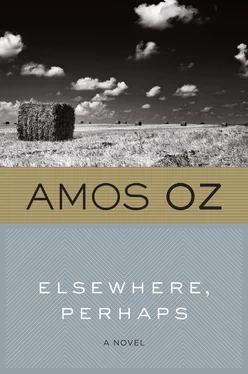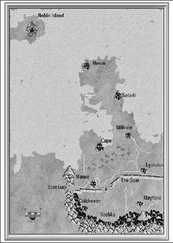The others smoked in silence. Asis remarked, not to Ezra Berger in particular, that a bent oar had cost them two broken pressure lamps. Kabilio said that at today's prices it would cost sixty pounds to replace them if it cost a cent. Asis thought it wouldn't cost more than forty. Forty at most. Ezra asked whether Babadjani had been let out yet. Yes, yes, Abushdid said happily, Babadjani's been let out. He had a stroke of bad luck. He's out now. You never know what you've got coming to you. Your luck hides away in a dark corner, and suddenly it jumps out and kicks you in the teeth.
Ezra inquired where Babadjani was. Babadjani's on the water, Asis said. He might look in later. Or he might make straight for home. You never know what a man'll take it into his head to do.
Noga asked softly why the fishermen here worked with rowboats and not with motorboats. Gershon Saragosti smiled for a moment, then stopped smiling and said:
"We're just simple folk, sweetheart."
The coffee was strong, with an intoxicating smell of spices. Abushdid explained to Noga that the smell came from the cardamom.
An easterly breeze blew off the lake, bringing with it a rich black fragrance. A night bird's call sounded. Gershon Saragosti was smoking a strong-smelling foreign cigarette. Ezra asked if he could have one. Saragosti apologized for not offering. He was too tired to think straight. Anyway, he'd had all sorts of pains in odd places these last few days. This is no life, God knows. It's no life if you're not healthy. You must know what the Bible says about that, Ezra. When you're not young any more, you're not happy. Doesn't it say something like that in the Bible? Here, have a cigarette. Take one for your daughter, too. Or don't you let her smoke yet? Too young? Take one for yourself. So what does the good book say?
"'His life abhors bread and his soul dainty meat, his flesh is consumed so that it cannot be seen, yea, his soul draws near unto the grave, and his life to the destroyers'; that's what it says in the Book of Job, and there's a great moral. Listen, Kabilio, you listen, too. It says that a man mustn't complain. Why should we accept the good and not accept the bad? I say this not as a religious man, Saragosti, but quite simply; you have to take the rough with the smooth. One day you're licking honey, the next you're chewing onions, as they say."
"You're right, Ezra, by the holy Torah you're right. It's a hard life. Is this your daughter, Ezra? She doesn't look much like her father. She's got a very beautiful mother, I should say."
Noga said yes, her mother was very beautiful. And the fisherman, draped in a rough overcoat, his cheeks sprouting stubble, asked, if her mother is so beautiful, why her father wanders around the world like a man with no place to go.
"My father," Noga said with a sidelong glance at Ezra, "my father is a very special man."
"A very special man, by the holy Torah, by my life," said Abushdid. "A simple, uneducated man but he knows the Torah and he knows life. He's a wise man."
"A wise man has eyes in his head," Ezra said slowly, "and where are my eyes? In hell, that's where my eyes are, Abushdid."
"Why do you say such wicked things, Ezra, why do you curse yourself in front of your daughter? You shouldn't do it. That's the way to bring bad luck on yourself, it is, Heaven forbid."
"My daughter knows. My daughter's not a child any more. She's old enough to see. The fool sees with his eyes, but the wise man sees straight to the heart. Isn't that right, Turquoise?"
"Whatever you say is always right, Daddy."
Ezra asked Noga if she was happy here. Noga said of course she was. She'd never been anywhere like this before. Ezra asked if she felt better now. Noga replied that now she didn't feel anything. Gershon Saragosti smiled at her and said again:
"We're just simple folk."
And again he smiled. His face seemed made to smile.
Silence.
Asis began to tell, from his corner, the story of how two pressure lamps that were as good as new were broken. Kabilio helped him when necessary by supplying forgotten details. Abushdid dozed at his counter. Gershon Saragosti, too, was asleep, slumped over a table some way away. Turquoise rested her head on her daddy's shoulder. Ezra thought she was asleep. But Noga was awake. Her tears caressed his shoulder through the dusty shirt.
Through the doorway opposite a stretch of water showed. The lake. Black and vaguely chilly.
Abushdid woke up and turned on the radio, fiddled with the knob and found a faraway station broadcasting dance music. A sharp eye could make out the shapes of the mountains beyond the dark lake. Yellow lights flickered there, hovering mysteriously between the water and the stars, inexplicable unless one was aware of the presence of the mountain which was reflected on the black water. It was three o clock in the morning.
Saragosti and Asis rose to leave.
"No Babadjani," said Kabilio.
"We can't wait for him till morning," Gershon Saragosti said.
"Any message for him?" asked Kabilio.
"No message. Only to steer clear of bad luck," said Asis.
"And you stick to good luck, the pair of you," said Abushdid.
The murmur of the easterly breeze. Ripples stirring on the water. The roots of the mountains hidden in the sea bed. Nothing intervenes. The moon has set. In the silent deep live the fish. Breathing through gills. Some swim in shoals; others prefer solitude. Vast expanses of dark water open up before them. They are free to wander as they choose. The air is damp. A report sounds. Noga asks what that strange sound was. Ezra stares at her as if he has difficulty in recognizing her. He pauses for a long while, as if he has forgotten, as if he will never answer. At the end of his silence his speech is blurred.
"Sound of oars. Asis and Saragosti are out on the water."
Softly Noga murmurs:
"Now."
PART TWO.The Clapper in the Bell
24. AN UNDESIRABLE CHARACTER
Six weeks later the last signs of spring died away. The cornfields turned gray and dry under the white light. The luxuriant vegetation gave way to skeletal brambles. A deadly pressure seemed to flow down from the mountains. Long blazing blinding dazzling days. But for three days a false autumn reigned.
Such false autumn days occur occasionally in our summer. In the morning a blessed coolness blows from the west. Dark clouds like a band of strolling players come between us and the fearsome light. A gentle breeze murmurs in the foliage and in the pine needles, and a cool dampness bears witness to the new regime. Deep breath expands the chest. Even the cramped muscles of the eyelids relax somewhat, free from the terror of the cruel glare. Everyone relaxes and gulps in the welcome freshness of the autumn air.
But these low clouds, these faithless nomads, are deceptive. In the morning they court us, but at midday the feigned mask of kindness falls away, and they display their true ferocity. Dampness and oppressive heaviness beat down mercilessly, and the familiar leaden grayness returns to the sky. Soon the white light is back, clear and bright and savage.
Early on one of these false autumn days, at breakfast time, a long yellow taxi drew up in front of the dining hall. A dark-suited man wearing a purple tie got out, holding a small blue case in his left hand. For a moment he inspected his surroundings, closing one eye and opening the other wide, and pensively rolling out his lower lip. His face suddenly contorted into what looked like a forced smile. He put down his case, produced a green handkerchief, and carefully wiped his forehead, his chin and both his hands. Then he lit a cigarette and waved his arm casually to the driver, who was watching him through the car window. The driver understood his meaning and settled back in his green leather seat for a long wait.
Читать дальше












